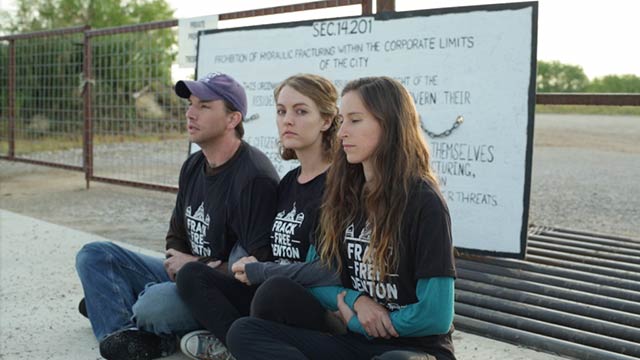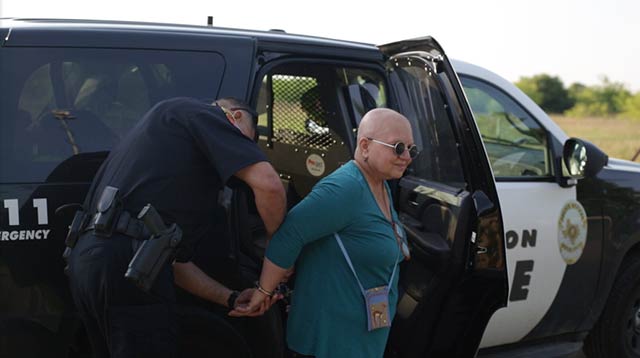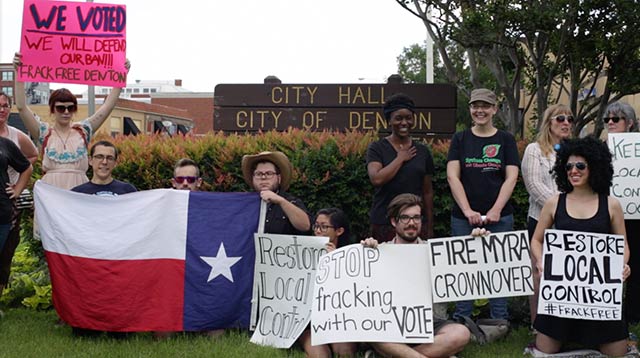
Part of the Series
Planet or Profit
Did you know that Truthout is a nonprofit and independently funded by readers like you? If you value what we do, please support our work with a donation.
For years, environmental philosophy professor Adam Briggle has opened his ethics classes at the University of North Texas in Denton with writings on nonviolent civil disobedience, usually Henry David Thoreau’s classic essay “Resistance to Civil Government.” But Briggle has never before engaged in such an action himself — until now.
On June 1, Briggle, who is president of the Denton Drilling Awareness Group (DAG), one of the driving forces behind a citizen-led initiative that banned fracking in Denton city limits in 2014, delayed scheduled fracking operations at a Vantage Energy gas well site on the edge of the city’s west side by blocking the entrance to the site Monday morning for about an hour.
Denton police arrested Briggle, alongside DAG Vice President Tara Linn Hunter and resident Niki Chochrek, after they refused to move from the entrance of the Colorado-based oil and gas company Vantage Energy site, issuing criminal trespass citations to all three. The group sat down in front of a blown-up, wooden display of Denton’s ordinance prohibiting fracking in city limits, which the police had to use bolt cutters to dismantle in order to open the gate of the entryway. Later that day, they were released from Denton City Jail on personal recognizance.

Whether Briggle’s act fits into the traditional definition of civil disobedience — which usually entails conscientiously breaking a law one views as unjust in order to change it — presents a sort of philosophical conundrum for the philosophy professor, because he’s actually just trying to uphold Denton’s democratically approved ordinance prohibiting fracking.
“Maybe it’s not even civil disobedience,” Briggle told Truthout before his arrest. “But I also realize though, that it’s something that has to be taken very seriously…. Something has to rise to a certain level to warrant an act of defiance, and I feel like there’s a lot of ingredients that go into that, but one of them is: Have you exhausted all other pathways by which to change things and accomplish justice?”
“In a naked display of corruption, the industry bought a new law.”
The Texas Legislature’s early May passage of House Bill 40, a law rendering Denton’s fracking ban unenforceable and limiting cities’ ability to regulate the oil and gas industry across the state, rises to just such a level, leaving activists like Briggle with no other recourse but to use direct action tactics. The bill was written directly in response to Denton’s citizen initiative banning fracking.
“In a naked display of corruption, the industry bought a new law,” Briggle said in a statement released after his arrest. “An apoplectic orgy of irrationality in Austin spawned HB 40.”
On Tuesday, June 2, three more Dentonites, Rodney Love, Jonathon Vann and Elida Tamez, were arrested in front of the entrance gates to the Vantage Energy well site for criminal trespassing. They were likewise released on personal recognizance.

Five other organizers, including one legal observer, were issued trespass notices effectively prohibiting them from being anywhere on the Vantage Energy property, despite that a group of about 20 other protesters were allowed to remain just off to the side of the site’s entrance. None of the other five organizers had been arrested blocking the entryway. A Denton Police Department spokesman said he was not aware of the trespass notices and could not answer questions concerning the notices.
Vantage Energy spokeswoman Nancy Farrar has not responded to Truthout’s request for comment, but told the Denton Record-Chronicle the company was still deciding whether to pursue criminal charges.
Dentonites like Briggle have struggled for the last six years for regulation of the oil and gas industry’s operations within city limits, exhausting every single institutional avenue available to regulate and reform the fracking (and re-fracking) of Denton’s more than 281 gas wells, many of which have been placed dangerously close (within 200 feet in some spots) to parks, schools and homes in the city.
My neighbors and I have seen violations of every shape and size, from gas companies operating without permits, to illegal dumping of fracking wastewater and spills, to gas well blowouts and subsequent evacuations of surrounding residential neighborhoods.
HB 40 eviscerates more than 100 years of Texas’s proudly held tradition of local control.
According to the Denton Record-Chronicle, Denton has spent more than $920,000 rewriting regulations to accommodate oil and gas operations in the city during the last four years. City officials worked to revise Denton’s gas drilling ordinance in several phases throughout 2010 to 2013, in an effort to address residents’ ongoing concerns about drilling setbacks (the mandated distance a gas well must be from a residential building) and air and water quality issues. The city created a controversial industry-stacked task force to advise city officials in rewriting its gas drilling rules; the task force included three industry representatives (two of which were not residents of Denton) and two environmental researchers.
The city continued to revise its drilling rules throughout 2014 and 2015, authoring a “co-location” program for gas companies, which allows city officials to review an application to frack by coalescing multiple leases from a surrounding area to select a single location for multiple gas wells. While some activists have called the program an improvement, they have said it ignores other issues, such as reverse setbacks (how close a home developer can build from an existing gas well).
But oil and gas companies have refused to follow many of the new rules the city adopted, claiming instead that their drilling activities were grandfathered under old rules. The companies’ claims that their rights to frack older gas wells are vested under previous rules became a primary catalyst driving Dentonites’ push for a ballot initiative to ban fracking entirely in the city — which was approved by a 59-percent majority in November 2014.
HB 40 not only bans fracking bans in Texas, but it also eviscerates more than 100 years of the state’s proudly held tradition of local control, known as home rule authority, by preempting cities’ ability to effectively regulate oil and gas industry operations. The new law is part of a wider American Legislative Exchange Council (ALEC)-backed strategy emerging in Republican-dominated state legislatures this year aimed at curtailing municipalities’ regulatory authority at the behest of industry.
While anti-fracking activists continue to work out a legal strategy to potentially challenge the new preemption law, Dentonites are now embarking on an ambitious campaign of nonviolent direct action in what has become their last resort to defend their democracy. As Republican legislatures continue to preempt local regulatory authority across the nation, it’s a strategy that other municipalities may be forced to consider moving forward.
City Officials Consider Repeal
City officials are now considering whether HB 40 is a reason to repeal Denton’s fracking ban ordinance, deciding in a packed June 2 city council meeting to take no action on an agenda item that would repeal the ban after an overwhelming majority of residents told councilors they should table the item to allow more time for public input.
During the meeting, council members explained that the new law represents a legal risk to the city because two lawsuits brought against the ban by the Texas Oil & Gas Association and Texas’s General Land Office are still playing out, telling residents that a settlement between the parties in the case remains unlikely.
City council members expressed concern that if a Denton district judge rules against the city’s ban, citing HB 40, the ruling may create an unfavorable legal precedent for Denton and other Texas cities. “Repealing the ban ordinance pulls the carpet out from under the industry and doesn’t give them the pleasure of getting an early legal assist on this issue,” Councilman Kevin Roden wrote on his blog.
During the meeting, some residents suggested passing an additional ordinance that would amend the fracking ban in order to leave it on the books, and council members directed the city’s attorney to draft potential legal language for such an ordinance.
Other legal gray areas left by the passage of the new law have city officials asking questions on a number of fronts, including which aspects of the city’s drilling regulations and moratorium remain enforceable under HB 40.

Many residents have asked whether the city can simply elect not to enforce its ban, and whether or not the ban is still law until a judge rules otherwise. According to Lindsey Baker, a city public information officer, the city must simply follow the lead of the state since the state legislature has the authority to completely preempt the city. A judge does not have to overturn the ban in court to nullify the city’s ordinance.
The new law requires city regulations to pass a four-part test to be viable. Under the test, a city ordinance regulating oil and gas operations must: not apply to subsurface activity, be determined by the industry to be “commercially reasonable,” not prevent oil and gas activity from happening, and not already be preempted by another state or federal law.
“We’re trying to figure out what [‘commercially reasonable’] means,” Denton Mayor Chris Watts told Truthout. “HB 40 says we can regulate setbacks, but then it has a further question: Is that a quote-unquote ‘reasonable’ setback? And we don’t know the answer to that question, so we’re having to go back and reevaluate our ordinances, as every city in the state of Texas is having to do.”
Watts told Truthout the city isn’t currently drawing up plans for a legal challenge to HB 40, but the city could potentially be asked to join an alliance of cities bringing such a challenge forward. If the city is asked to join the coalition, council members would need to discuss the issue, he said. During the June 2 city council meeting, city attorney Anita Burgess told residents that there has been some dialogue between city attorneys about the idea.

Anti-fracking activists, however, are developing a legal strategy to challenge the new law. Deborah Goldberg, a New York-based attorney with the environmental law firm EarthJustice, who is currently representing Denton residents in the two lawsuits filed against the city, told Truthout that HB 40 could pose a substantive due process claim under the Texas Constitution because the new law makes sweeping changes to the state Constitution’s provisions protecting private property under municipal zoning authority.
While she believes there could be some precedent to challenge HB 40, DAG members read a statement from Goldberg during the June 2 meeting in which she recommended council members repeal the ban saying, “HB 40 must be taken down but taken down carefully.”
Allowances for oil and gas companies come with real, human costs to communities assumed disposable by bureaucratic decision-making bodies.
Mayor Watts expressed disappointment in the Texas Legislature for failing to address the root issues that drove Denton residents to ban fracking. “Denton, or any other city in the state of Texas, could have an ordinance that complies with HB 40, is ‘commercially reasonable,’ passes all the tests, but an operator could say, ‘But you know what? We were vested in ordinances that predated your new ordinance that complies with HB 40, so we’re not subject to that ordinance,'” he said.
The city’s drilling moratorium, which was put in place May 6, 2014, to allow city officials to yet again revise the city’s drilling regulations, is still effective and has yet to be found in violation of HB 40. According to Watts, Vantage Energy received an exception pursuant to the city’s moratorium to frack at the site where activists have interrupted operations this week. The city’s well inspectors are actively monitoring the Vantage site for violations of the city’s drilling ordinance, city officials said.
Vantage Energy not only received an exception to the city’s drilling moratorium but also received another exception, known as a variance, from the city’s setback requirement from Denton’s Zoning Board of Adjustments.
Such allowances for oil and gas companies come with real, human costs to the communities assumed disposable by bureaucratic decision-making bodies — on both the state and local levels — which exempt oil and gas companies from the rules.
A House-Bill-40 Sacrifice Zone
If it weren’t for HB 40, Vantage Energy would not be allowed to frack in Denton city limits in the first place. Now, in addition to being able to frack within the city, Vantage has gained additional permissions: Denton’s Zoning Board granted the company a permit to operate approximately 400 feet from homes across from Nail Road, which are not technically within Denton’s city limits.

Vantage Energy previously fracked the well site located along Nail Road last summer, receiving a hardship waiver to do so before Dentonites voted on and passed the city’s fracking ban in November. Many residents of the 80-home Spring Hill Estates neighborhood across from the gas well site told Truthout that Dentonites’ decision to ban fracking was their saving grace during the seven months the ban was legally in place.
Vantage Energy released the following statement to the Denton Record-Chronicle:
Open communication has been central to a productive working relationship between our company, Vantage Energy, and the city of Denton. Since the ban on hydraulic fracturing took effect in 2014, we have maintained regular dialogue with Denton city officials, presented path forward alternatives and last week followed the city’s guidelines in communicating our plans to resume work on June 1. Likewise, city officials announced that they are aware of our plans.
While Vantage Energy claims it has maintained communication with Denton officials, its communication with those directly impacted by its gas drilling operations has been less than forthcoming, according to residents.
As of May 27, many residents said they hadn’t received any notice of Vantage Energy’s plans to restart fracking operations at the Nail Road gas well site June 1. Some residents said they had received a notice in the mail telling them fracking would begin May 27. One resident told Truthout she heard about the company’s plans to frack the site first while listening to local news. For others, organizers from Frack Free Denton, who canvassed the neighborhood to educate residents about the impending fracking and its potential impacts, were their first line of notification.
“We moved out here to have a little peace and quiet, and now Big Oil is going to come in and ruin our backyard.”
Vantage Energy has a less than stellar track record in the state of Texas. After lightning struck near a Vantage Energy gas well in the middle of a residential neighborhood in Denton in May, the well burned for more than seven hours during the time it took Vantage Energy contractors based in Houston to travel to Denton to turn off the flow of gas. In April, more than 50 residents in Arlington, Texas, were evacuated from their homes due to a leak at a Vantage Energy gas well site.
The Spring Hill Estates community shares well water which many residents allege was contaminated by Vantage Energy’s fracking operations in 2014. According to the residents, the company that operates the well, Aqua Texas, subsequently treated the well with chemicals on several occasions, even posting signs around the neighborhood instructing residents to boil the tap water for two weeks before drinking it.
None of the Spring Hill Estates residents Truthout spoke with said they drink their tap water straight from the faucet without filtering or boiling it first, and most said they don’t cook with it. Residents said that the water leaves their skin with an oily feeling after they shower, and that it stings their eyes.

Residents Liz and Shane Ramsey don’t drink their tap water, but say their water bill has spiked since they moved in to the Spring Hill Estates neighborhood. “Sometimes it smells like a swimming pool — chlorine or whatever chemicals they’re putting in there. You can smell it on your clothes. You can smell it in your hair,” Shane Ramsey told Truthout.
The Ramsey’s say their water utility bill has quadrupled in price from approximately $30 a month to more than $120 a month, including excessive late fee charges that they say they’ve been powerless to contest, telling Truthout that Aqua Texas cuts off their water about twice a year over unpaid late fees. It’s unclear why their rates have gone up so much. An Aqua Texas spokesperson did not respond to Truthout’s request for comment.
The couple says the company doesn’t actually know how much water they’re using because they have never seen anyone read their meter. According to their policy, if no one comes out to read the meter, the company estimates charges from the previous month.
Organizers from Frack Free Denton arranged to have Kilgore, Texas-based Ana-Lab Corp. collect baseline water samples of the community’s well water for testing Friday, May 29, before fracking operations began at the Vantage Energy Nail Road gas well site. The lab is also testing for surfactants used in the fracking process.

The couple’s tap water is just one of the problems they have had to put up with since Vantage Energy moved in across Nail Road. The Ramsey’s say the noise and light associated with fracking operations at the site last summer has significantly impacted their quality of life.
“The ambience comes through the ground, and that is non-audible by the ear, but it works on your psyche. Even the dog changes the way he acts,” Shane Ramsey said. “But that noise is a low-humming noise, and in the master bedroom … you can hear it 24/7. It never goes away.”
Shane Ramsey would know — and not just from living next to a frack site. He previously did oil and gas work as a derrick hand at sites throughout Texas off and on for about five years. “I’ve always been against [fracking],” he said, claiming that more traditional forms of drilling are less environmentally damaging.
Liz Ramsey also has a history with drilling: Before moving to Denton’s city limits, she witnessed the destruction of the Gulf Coast while living in Corpus Christi in the aftermath of the 2010 BP oil spill.
“We moved out here to be outside of town and to have a little peace and quiet, some elbow room and fresh air, and now Big Oil is going to come in and ruin our backyard,” she said.
Beyond City Limits
For the Ramsey’s, the direct action Denton residents have taken this week is an expression of solidarity with a neighborhood just beyond the legal protection of Denton’s drilling ordinances. For me, it is a symbol of a citywide movement expanding beyond the borders that determine a municipality, and which foreshadows the potential birth of a larger rebellion against the oil and gas industry in Texas.

Denton’s narrative is no longer simply tied to issues of industry proximity to residential neighborhoods; it now reaches beyond city limits to connect with all Texans impacted by HB 40’s sweeping mandate to strip communities of their right to determine what’s in their best interest.
“This question of urban drilling has really just begun, … and if it weren’t for this hydraulic fracturing ban that was voted for in Denton and passed, we wouldn’t be having this intensive conversation,” Mayor Watts said. “This is having an impact on the conversation around the nation and honestly, around the world.”
The Frack Free Denton movement is finding its place in this larger, global conversation around the struggle for climate justice in a state hit by extreme flash flooding, which has claimed at least 22 lives this spring in the wettest May on record in Texas. President Obama declared the flooding a “major disaster.” Meanwhile, other parts of the nation, including California and Washington State, continue to be affected by extreme drought.
“Personally, I can’t divorce these two things; it’s all mangled together, that we are talking about fossil fuel extraction and we are talking about the need to change that in order to achieve climate objectives to leave a planet for our future generations,” Briggle told Truthout. “This is part of a bigger picture here. How are we going to wean ourselves off of fossil fuels if we can’t even determine to do that at a local level as a community?”
Speaking against the authoritarian crackdown
In the midst of a nationwide attack on civil liberties, Truthout urgently needs your help.
Journalism is a critical tool in the fight against Trump and his extremist agenda. The right wing knows this — that’s why they’ve taken over many legacy media publications.
But we won’t let truth be replaced by propaganda. As the Trump administration works to silence dissent, please support nonprofit independent journalism. Truthout is almost entirely funded by individual giving, so a one-time or monthly donation goes a long way. Click below to sustain our work.